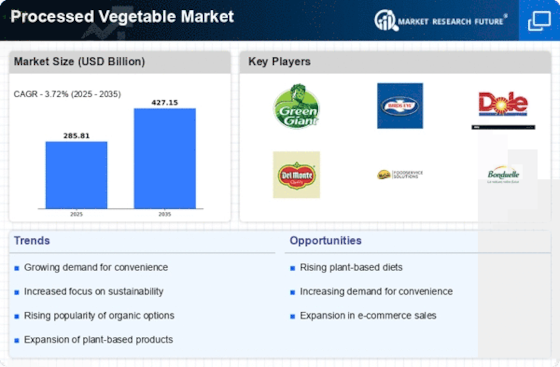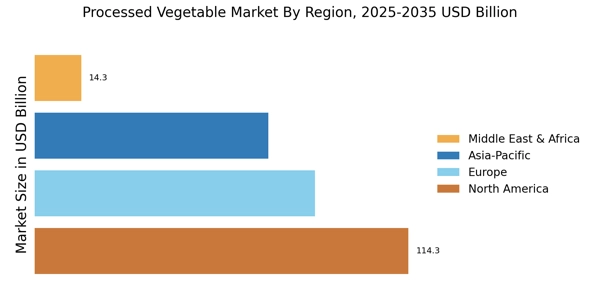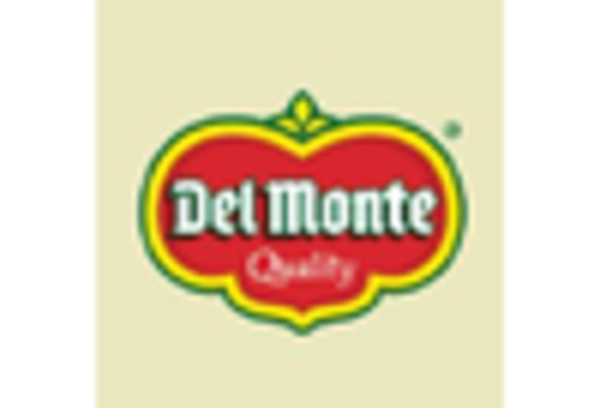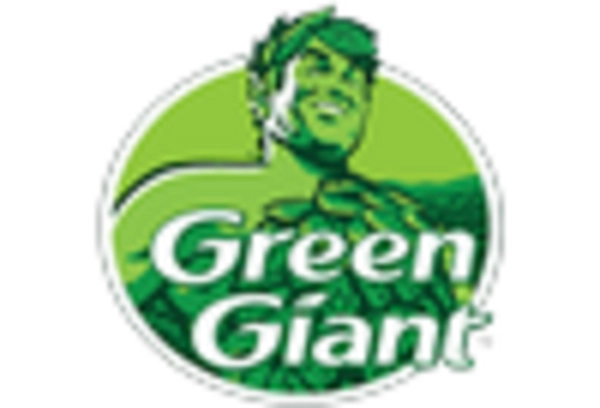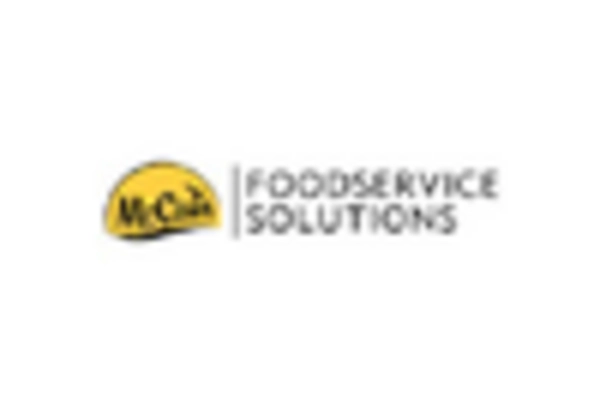Plant-Based Innovations
The rise of plant-based diets is reshaping the landscape of the Processed Vegetable Market. As more consumers adopt vegetarian and vegan lifestyles, the demand for innovative plant-based products is surging. This trend is not merely a passing fad; it appears to be a fundamental shift in dietary preferences. Market data suggests that the plant-based food sector is expected to reach a valuation of over 74 billion dollars by 2027, with processed vegetables playing a significant role in this growth. Manufacturers are responding by developing a diverse range of products that cater to this burgeoning market, including plant-based snacks and ready-to-eat meals. The Processed Vegetable Market is thus positioned to benefit from this trend, as it aligns with the increasing consumer interest in health, sustainability, and ethical eating.
Health-Conscious Choices
The increasing awareness of health and nutrition among consumers appears to be a pivotal driver for the Processed Vegetable Market. As individuals become more health-conscious, they are actively seeking out products that offer nutritional benefits without compromising on taste. This trend is reflected in the rising demand for processed vegetables that are low in sodium and free from artificial preservatives. According to recent data, the market for processed vegetables is projected to grow at a compound annual growth rate of approximately 5.5% over the next five years. This growth is likely fueled by the shift towards healthier eating habits, as consumers prioritize products that align with their dietary preferences. Consequently, manufacturers in the Processed Vegetable Market are innovating to create products that cater to these health-conscious consumers, thereby enhancing their market presence.
Sustainability Initiatives
Sustainability has emerged as a crucial consideration for consumers and manufacturers alike, significantly influencing the Processed Vegetable Market. As environmental concerns gain traction, there is a growing demand for sustainably sourced and packaged products. This shift is prompting companies to adopt eco-friendly practices, such as reducing carbon footprints and utilizing biodegradable packaging. Recent statistics indicate that a substantial portion of consumers is willing to pay a premium for products that are environmentally friendly. This trend not only reflects a change in consumer preferences but also encourages manufacturers to innovate in their sourcing and production processes. The Processed Vegetable Market is thus witnessing a transformation, as companies strive to align their offerings with sustainability goals, potentially leading to increased market share and consumer loyalty.
Convenience and Ready-to-Eat Options
The demand for convenience in food consumption is a notable driver for the Processed Vegetable Market. As lifestyles become increasingly fast-paced, consumers are seeking quick and easy meal solutions that do not compromise on nutrition. Processed vegetables, particularly those offered in ready-to-eat formats, are gaining popularity as they provide a convenient option for busy individuals and families. Recent surveys indicate that a significant percentage of consumers prefer meals that require minimal preparation time. This trend is prompting manufacturers to innovate and expand their product lines to include more convenient options, such as pre-cut vegetables and microwaveable meals. The Processed Vegetable Market is thus adapting to meet these evolving consumer needs, potentially leading to increased sales and market penetration.
Technological Advancements in Processing
Technological advancements in food processing are playing a transformative role in the Processed Vegetable Market. Innovations in preservation techniques, such as freeze-drying and high-pressure processing, are enhancing the quality and shelf life of processed vegetables. These technologies not only improve the nutritional profile of products but also cater to consumer preferences for fresh-tasting options. Market analysis indicates that the adoption of advanced processing technologies is likely to drive growth in the industry, as manufacturers seek to differentiate their offerings. Furthermore, these advancements enable companies to maintain competitive pricing while ensuring product quality. As a result, the Processed Vegetable Market is poised for growth, driven by the continuous evolution of processing technologies that meet consumer demands.


